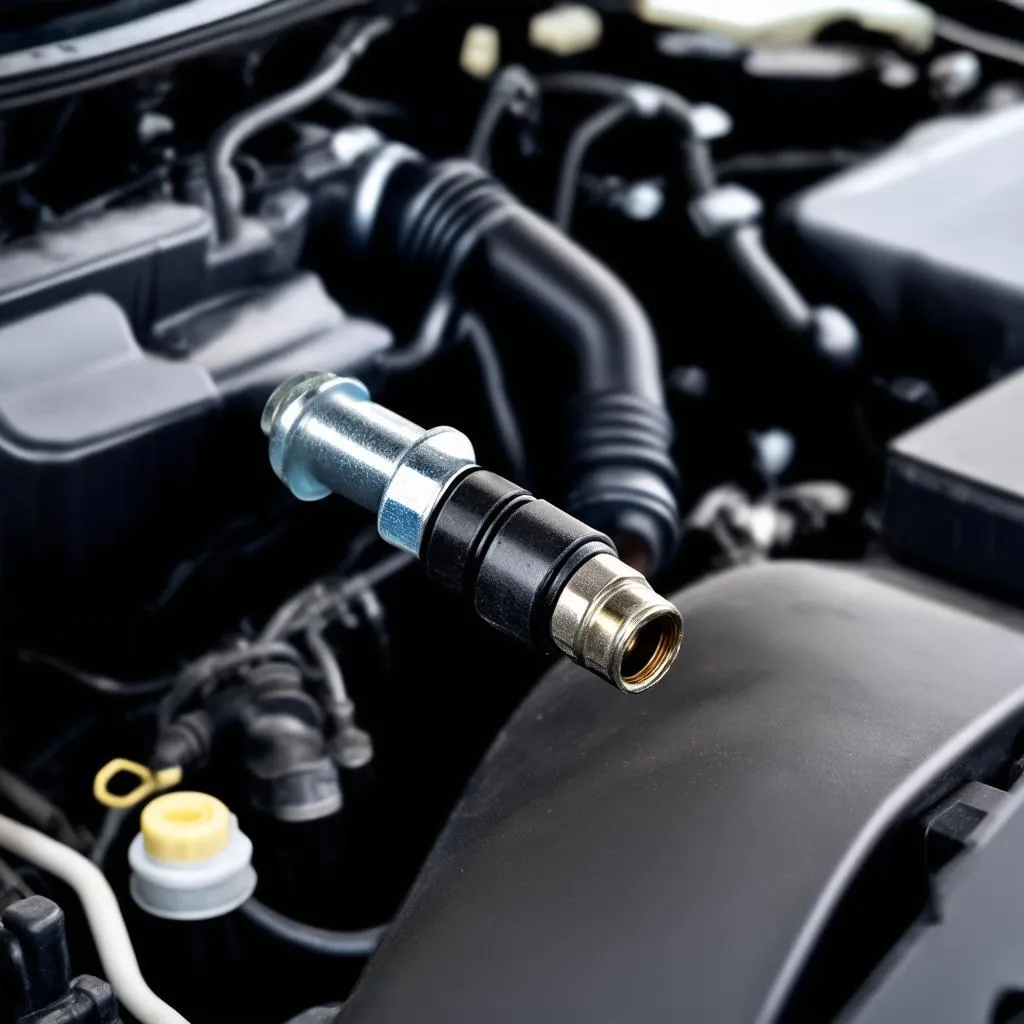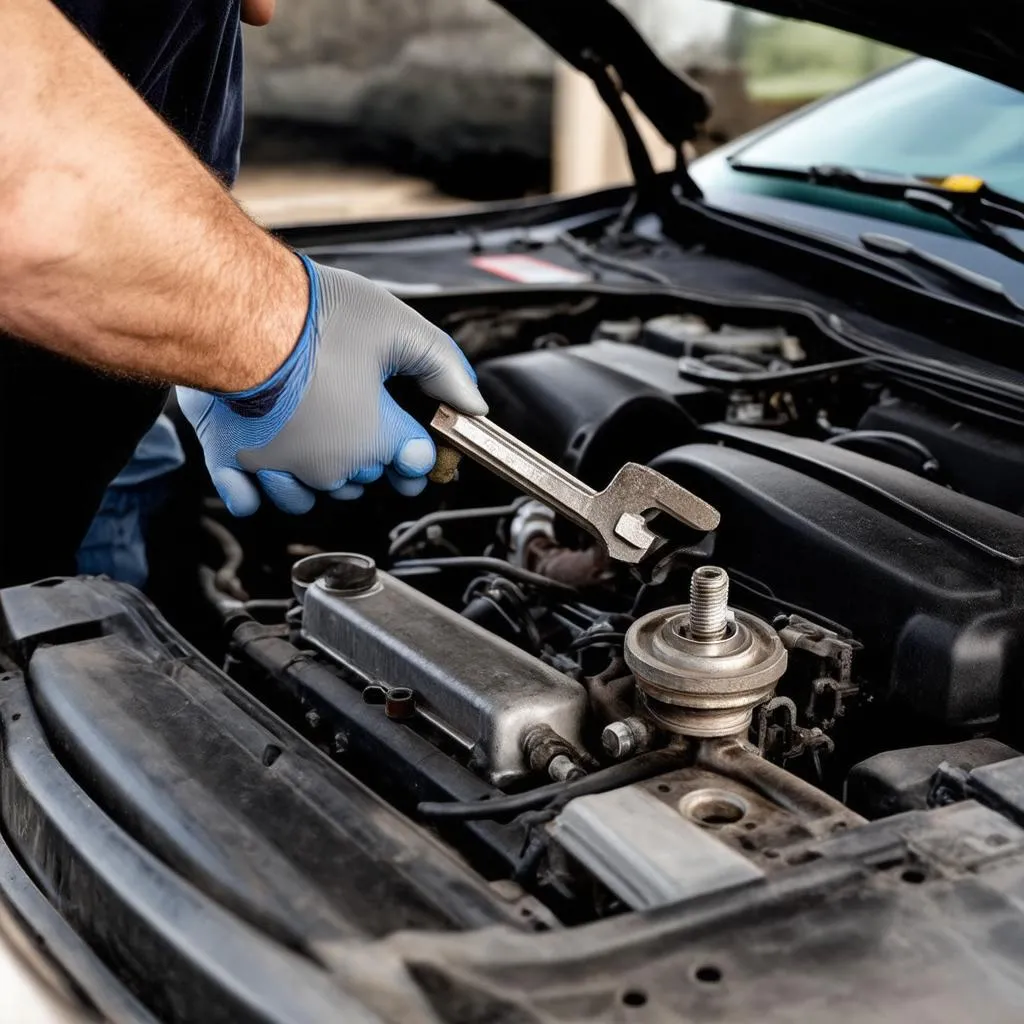Imagine this: you’re cruising down the highway in your trusty 2002 Volkswagen Jetta GLS, the wind in your hair (or at least, the AC blasting). Suddenly, that dreaded Check Engine light pops up on your dashboard, like a beacon of automotive doom. You plug in your trusty OBD2 scanner, hoping for a quick fix, only to be met with a cryptic code related to your O2 sensor. Don’t panic! This is a common issue, and with a little guidance, you can get your Jetta back to its former glory.
What Does an O2 Sensor Code Mean in My 2002 Jetta GLS?
Before we delve into the specifics, let’s talk about what an O2 sensor does. Think of it as the lungs of your Jetta’s engine. It constantly monitors the oxygen content in the exhaust gases, ensuring the optimal air-fuel mixture for combustion.
When your OBD2 scanner throws out an O2 sensor code, it’s essentially telling you that something isn’t quite right with this delicate balance. This could range from a simple faulty sensor to a more complex issue like a vacuum leak or a failing catalytic converter.
Common O2 Sensor Codes and Their Meanings
Here are some common OBD2 codes you might encounter on your 2002 Jetta GLS, specifically related to the O2 sensor:
-
P0130 – P0135: These codes indicate a problem with the O2 sensor circuit on Bank 1, Sensor 1. This is the sensor located before the catalytic converter on the engine bank containing cylinder #1.
-
P0136 – P0141: These codes point to an issue with the O2 sensor circuit on Bank 1, Sensor 2. This sensor is positioned after the catalytic converter on the same engine bank.
-
P0150 – P0155: Similar to the P0130-P0135 range, these codes indicate a problem with the O2 sensor circuit on Bank 2, Sensor 1. This applies to engines with two cylinder banks.
-
P0156 – P0161: Like the P0136-P0141 range, these codes relate to an issue with the O2 sensor circuit on Bank 2, Sensor 2.
Diagnosing and Fixing the Issue
Now, let’s talk about what to do when these codes rear their ugly heads. It’s essential not to jump to conclusions and start replacing parts haphazardly.
-
Start with the Basics: Check for any loose connections or damaged wiring around the O2 sensors. Sometimes, the solution can be as simple as a loose wire.
-
Inspect for Vacuum Leaks: A vacuum leak can disrupt the air-fuel mixture and trigger O2 sensor codes. Listen for hissing sounds coming from the engine bay, and visually inspect vacuum hoses for cracks or loose connections.
-
Test the O2 Sensor: If the wiring and vacuum system check out, the O2 sensor itself might be faulty. You can test it using a multimeter, following the manufacturer’s specifications.
-
Consult a Professional: If you’re not comfortable working on your car or the issue persists, it’s best to consult a qualified mechanic. They have the expertise and tools to diagnose and repair the problem effectively.
 car engine oxygen sensor
car engine oxygen sensor
Why Addressing O2 Sensor Issues Matters
Ignoring O2 sensor problems can lead to a cascade of issues, impacting your Jetta’s performance, fuel economy, and even its environmental impact.
-
Decreased Fuel Efficiency: A faulty O2 sensor can throw off the air-fuel mixture, leading to rich running conditions (too much fuel) and significantly reducing your gas mileage.
-
Performance Issues: An imbalanced air-fuel mixture can cause engine hesitation, rough idling, and decreased acceleration.
-
Damage to the Catalytic Converter: A malfunctioning O2 sensor can cause the catalytic converter to work overtime, potentially leading to premature failure and costly repairs.
Frequently Asked Questions about O2 Sensors and OBD2 Codes
Q: Can I drive my Jetta with a bad O2 sensor?
A: While you might be able to drive for a short period, it’s not recommended. As discussed earlier, driving with a faulty O2 sensor can lead to further engine damage and reduced fuel efficiency.
Q: How much does it cost to replace an O2 sensor?
A: The cost of replacing an O2 sensor varies depending on the make and model of your vehicle and whether you choose to do it yourself or hire a mechanic. Generally, you can expect to pay between $50 and $250 for the sensor itself, plus labor costs if applicable.
Q: How often should I replace my O2 sensors?
A: O2 sensors typically last between 60,000 and 90,000 miles. However, it’s a good idea to consult your owner’s manual for recommended service intervals.
 mechanic working on car engine
mechanic working on car engine
Related Questions and Resources
- How to Check Your Car’s Engine Oil: A Step-by-Step Guide
- Understanding Your Car’s Cooling System: A Comprehensive Overview
- Common Volkswagen Jetta Problems and Solutions
Get Expert Help with Your Volkswagen Jetta
Need help diagnosing those pesky OBD2 codes or fixing your Jetta’s O2 sensor issues? Don’t hesitate to reach out to our team of automotive experts via WhatsApp at +84767531508. We’re available 24/7 to provide personalized assistance and help get your Jetta back on the road in top shape.
Drive Smoothly and Confidently with Techcarusa.com
We hope this guide has provided valuable insights into understanding those confusing O2 sensor codes on your 2002 Volkswagen Jetta GLS. Remember, regular maintenance and timely repairs are key to ensuring your vehicle’s longevity and your peace of mind.
Do you have any other questions or tips to share? Feel free to leave a comment below or connect with us on social media! We love hearing from fellow car enthusiasts.